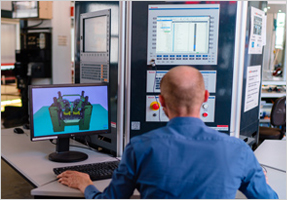
The Connected Factory: Standards are Starting to Stick
Original Content Written By: Bernd Müller from LAPP
According to Oliver Riedel, professor at the Institute for Control Engineering of Machine Tools and Manufacturing Units (ISW) at the University of Stuttgart, data networks in factories need to be fast, standardized and real-time capable.
Yet there is still much to be done before this can be achieved. As the leading manufacturer of cables, LAPP is gearing up for change.
The Internet has reached the factory. Controls, drives, sensors, and machines are all networked, exchanging data ceaselessly. Data volumes and interconnectedness, from the sensor to the cloud, will continue to skyrocket.
Traditional IT services, such as business or logistics software, are part of this networking phenomenon. And yet the infrastructure for data exchange used in many companies is stubbornly defying this trend towards interconnection.
Outdated individual networks with separate software and infrastructure dominate here. Every level of the automation pyramid, from the management level right down to the field level, functions with its own infrastructure and separate protocols.
“The many different networks here will merge together,” says Oliver Riedel, adding: “The automation pyramid will gradually disintegrate as a result.”
Instead of hierarchical communication structures in automation, the professor from the ISW at the University of Stuttgart expects flexible hierarchies in which cyber-physical systems exchange data with each other, with corporate IT systems and with the cloud via a dense network.
A proliferation of standards
The current proliferation of communication standards poses a major obstacle to this goal. And yet the Ethernet standard (IEEE 802.3), which has really taken off since the early 2000s, has been networking PCs for decades and is known for being very fast and reliable.
However, this standard does not apply to factories because many suppliers have “bent” Ethernet over time, and there are now a dozen versions on the market that are not automatically compatible with the others.
And there are many more fieldbus standards, including Profibus, Modbus, and CC-Link, which as a whole still comprise almost half of installations.
This jumble is caused by many suppliers of automation components, who, in an effort to guarantee steady revenue for many years to come, attempt to force their customers into using proprietary standards. But what has failed to work on the public Internet will also not be successful within the walls of a factory.
Nowadays, users require general, open standards that allow barrier-free data flow for all areas and functions of a company. It is inevitable that the many networking standards will eventually converge into one overarching standard.
Another important communication requirement in automation, especially at the field level, is the ability to transmit data in real time. It doesn’t matter if a website loads half a second faster or slower when clicking on a link in a web browser.
But in automation, it all comes down to the millisecond, sometimes even the microsecond. Ethernet-based networks can currently only do this to a certain extent, as Ethernet works with random-access protocols and large packets (so-called frames), and is therefore not real-time capable per se.
Real-time capable with TSN
One solution would be Time-Sensitive Networking (TSN), a future standard based on a proposal by the Ethernet working group. Its main benefit is that it does not come from the field of automation, but from audio/video bridging, so it has met with fewer challenges and competitive backlash from automators.
Concert halls have real-time Ethernet so that the multitude of speakers can play the audio signals from various microphones unfailingly and without sound delay. Delays of just a few milliseconds between audio channels would cause echoes.
In terms of automation, TSN would have a number of benefits as a solution based on network convergence. All participants in a TSN network are time-synchronized, so they perform the right action at precisely the right time.
TSN has various traffic classes with different time slots to enable data to be prioritized by bandwidth and fidelity. Important information that must not be delayed gets higher priority as bandwidth and time slots are reserved for this.
TSN will be a standardized expansion of, and 100% compatible with, Ethernet. TSN cannot yet be purchased in many products, but the first devices and early adopters are out there.
OPC-UA gives new meaning to data
TSN ensures that data gets to where it needs to be just in time. But it does not contain any information on what this data means. There is a second standard to handle this: OPC-UA, a communication protocol for exchanging data between cyber-physical systems.
OPC-UA is now accepted as a de facto standard in communications for Industry 4.0. The problem is it is not real-time capable, but experts from the ISW in Stuttgart are already working on this with standardization committees.
“Communication is no longer a unique selling point,” says Oliver Riedel. “Those trying to fight against TSN or OPC-UA and continuing with proprietary solutions will probably not be able to stick it out for long.”
Security, in other words defending against cyber attacks, is another topic currently under discussion. Excellent solutions for safety, i.e. protecting employees, are already in place.
For example, machine operators need to be able to rely on the machine stopping immediately when the red emergency stop button is pressed.
This type of command has top priority in TSN. Given the attributes described here, TSN has the potential to solve the issue of the “Babylonian confusion of tongues” in industrial data communication.
Browse Industrial Cables & Connectors for the Automation Industry












